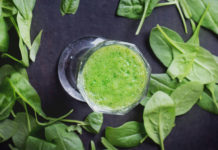Leafy greens are an important part of the DASH, or Dietary Approaches to Stop Hypertension, eating plan. Surveys continue to reveal, however, that 87 percent of Americans say they rarely or never eat nutrient-dense greens like kale, spinach, Swiss chard, or bok choy. Be part of the other 13 percent by loading your plate with leafy greens!
In my opinion, easier still is to buy organic mixed greens or kale in bulk bags and make green smoothies. I prefer blending to juicing, as the very important fiber component is maintained in the process. I add an organic tomato, and an organic apple as well.
Leafy greens share many healthy ingredients. Here are four that help maintain normal blood pressure:
FOLATE. This important B vitamin helps control blood pressure by interacting with nitric oxide (NO), released by cells lining the inside of the blood vessels. Nitric oxide is a vasodilator that keeps the arteries relaxed and flexible so they can keep blood flowing smoothly.
A combined study followed more than 150,000 women for eight years to see how folate affected their blood pressure. Those in their 30s and 40s cut their risk of high blood pressure by nearly half when they took 1,000 micrograms (1 mg.) of folate daily from both food and supplements.
Besides leafy green vegetables, you’ll find folate in asparagus, lentils, and pinto beans.
Potassium. When it comes to controlling high blood pressure, potassium packs quite a punch. It’s a key mineral that can balance out too much sodium in our diet, encouraging the release of nitric oxide to keep blood pressure in check. Other important sources of potassium include baked potatoes, acorn squash, and cantaloupe.
Calcium. This bone-building mineral keeps muscles, including our heart muscle, working strong and efficiently. It also helps to regulate blood pressure. Good sources of calcium include turnip greens, collard greens, and spinach.
Magnesium. Research shows magnesium works to lower blood pressure. Multiple double-blind studies, some going back over thirty years, reveal that those given magnesium supplements have a lower blood pressure than those given a placebo. (1,2,3,4,5)
Magnesium is plentiful in greens like spinach and collards, as well as avacados and pinto beans.
The DASH eating plan calls for 30 grams of fiber a day. You’ll get a good start toward that goal with a plate of leafy greens. Better yet, a green smoothie!
In future articles, I’ll be sharing my recipes for green smoothies with you. Stay tuned!
Don’t Get Caught In This Vicious Cycle
High blood pressure and atherosclerosis, better known as “hardening of the arteries,” create a cycle in which each makes the other worse.
As blood pressure rises in the arteries, elastic fibers in the arteries become damaged. As a result of this, artery walls become more stiff and rigid—and less flexible. When this happens, blood pressure rises even more.
Meanwhile, high blood pressure in the bloodstream pushes calcium ions in the blood into artery walls where they become embedded as plaque and further stiffen up the arteries. The stiffer the artery walls, the higher the blood pressure is likely to rise.
If blood pressure is not controlled, the cycle continues.
Quality Supplements That Help
There is no doubt that consuming enough of all the right foods each day can be a challenge. Adding to that challenge is the fact that our soil is frequently nutrient-depleted.
To help ensure a daily diet composed of the proper amount and balance of vitamins and minerals, I have recommended professional-grade Diamond Nutritionals’ Foundation Vitamins for many years. They are available in a Children’s Chewable as well.
References:
1.) Sanjuliani AF, de Abreu Fagundes VG, Francischetti EA. Effects of magnesium on blood pressure and intracellular ion levels of Brazilian hypertensive patients. Int J Cardiol. 1996 Oct 11;56(2):177-83.
2.) Itoh K, Kawasaka T, Nakamura M. The effects of high oral magnesium supplementation on blood pressure, serum lipids and related variables in apparently healthy Japanese subjects. Br J Nutr. 1997 Nov;78(5):737-50.
3.) Kawano Y, Matsuoka H, Takishita S, Omae T. Effects of magnesium supplementation in hypertensive patients: assessment by office, home, and ambulatory blood pressures. Hypertension. 1998 Aug;32(2):2605.
4.) Dyckner T, Wester PO. Effect of magnesium on blood pressure. Br Med J (Clin Res Ed). 1983 Jun 11;286(6381):1847-9.
5.) Witteman JC, Grobbee DE, Derkx FH, Bouillon R, de Bruijn AM, Hofman A. Reduction of blood pressure with oral mag- nesium supplementation in women with mild to moderate hypertension. Am J Clin Nutr. 1994 Jul;60(1):129-35.










I am a graduate Registered Nurse nursing student I need something to give me s boost when studying I am studying to take my State board exam I would also like to buy something to get rid of the fat in my belly can u inform me where I can get your products to buy locally I lives in fort Lauderdale Fl Broward county.Thanks Dr Maxwell may God continue to bless you
Hello Ms. Bell,
Congratulations on your accomplishment in Nursing! I understand how exhausting and stressful it can be.
All Diamond Nutritionals products are available online at http://www.AskDrMaxwell.com. Please take a moment to view our catalog.
I believe you will find many helpful products, including
Foundation Vitamins and Minerals which help balance the body chemistry and improve energy,
and Memory Support Formula which is used to improve memory and mental focus.
Blessings,
Dr. Maxwell